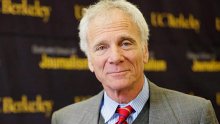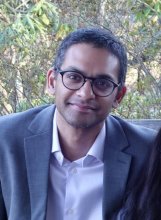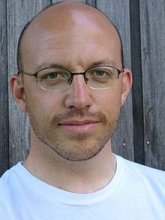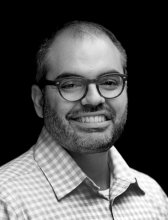Ethics and standards are critical considerations in the fields of journalism and data science, and certainly in the emerging discipline of data journalism. In this talk, panelists discuss the importance of these concerns and the obstacles and pitfalls that can mask or undermine truth and clarity in data-based reporting.
The Perils of Data Journalism
Edward Wasserman is professor of journalism and dean of the Graduate School of Journalism at the University of California, Berkeley.
Before coming to Berkeley in January 2013 he was for 10 years the John S. and James L. Knight Foundation professor of journalism ethics at Washington and Lee University in Lexington, Va. He writes and speaks widely on matters related to media rights and wrongs, technological change, and media ownership and control. His academic specialties include plagiarism, source relations, confidentiality and conflict of interest.
From 2001 to 2016 he wrote a biweekly column on the media that was distributed nationally by the McClatchy-Tribune News Service. He was a member of the executive board of the Association for Practical and Professional Ethics (APPE) and serves on the editorial advisory board of the Journal of Media Ethics. He has spoken to professional and academic groups throughout the United States and in Argentina, Brazil, Canada, China, Great Britain, India, the Netherlands, Sweden, Qatar, and China.
Wasserman joined W&L in 2003 after a career in journalism that began in 1972. He worked for news organizations in Maryland, Wyoming, Florida, and New York. Among other positions, he was CEO and editor in chief of American Lawyer Media’s Miami-based Daily Business Review newspaper chain, executive business editor of The Miami Herald, city editor of The Casper (Wyo.) Star-Tribune, and editorial director of Primedia’s 140-publication Media Central division in New York.
Wasserman received a B.A. cum laude in politics and economics from Yale, a license in philosophy from the University of Paris I, and a Ph.D. from the London School of Economics, where he studied media politics and economics.
Amit Bhattacharyya is the Head of Data Science at Vox Media, a modern media company focused on connecting with passionate and curious audiences. Amit works across all of Vox’s web properties in developing models to better understand audiences as well as working to deliver innovative product solutions such as personalization and recommendations to the platform.
Previously, he has led data science initiatives at both an education technology startup and an advertising agency. He started his career working as a quantitative analyst at various banks and hedge funds in New York City for 12 years.
Amit has been teaching in the MIDS program since 2016. He has enjoyed teaching courses diverse as introductory Python, data storage, and machine learning most recently. He particularly enjoys bringing real-world examples from his work into the classroom.
He received a Ph.D. in physics from Indiana University. He is a UC Berkeley alumnus, having majored in astrophysics and classics and a proud and long-suffering Cal football fan. Teaching has always been a passion of his and having a strong connection to his alma mater has been a dream come true.
In his spare time, he rides his road bike year-round, goes skiing at the first sign of powder, and dabbles with machine learning algorithms for fantasy football. He lives in New Rochelle, NY, with his wife and two teenage daughters, both of who have been known to occasionally show up for a MIDS class or two.
T. Christian Miller is an investigative reporter, author, and war correspondent for ProPublica. He has focused on how multinational corporations operate in foreign countries, documenting human rights and environmental abuses. Miller has covered four wars — Kosovo, Colombia, Israel and the West Bank, and Iraq. He also covered the 2000 presidential campaign. He is known for his work in the field of computer-assisted reporting and was awarded a Knight Fellowship at Stanford University in 2012 to study innovation in journalism. In 2016, Miller was awarded the Pulitzer Prize for Explanatory Journalism with Ken Armstrong of The Marshall Project.
Cheryl Phillips has been teaching journalism at Stanford since 2014 and is a founding member of the Stanford Computational Journalism Lab. She is involved in a cross-departmental effort with Sharad Goel, an Assistant Professor at Stanford in the Department of Management Science & Engineering, to collect police interaction data and evaluate racial disparities. The effort, called the Stanford Open Policing Project, is then working to share that data with journalists and researchers. Cheryl also is a member of the California Civic Data Coalition, A collaboration among data journalists to open up California campaign finance data and make it more accessible. Previously, she worked at The Seattle Times for 12 years. Her most recent position in Seattle was as Data Innovation Editor. In that role, she analyzed data for stories, facilitated online storytelling and coordinated newsroom data journalism training. She also was the deputy investigations editor, an assistant metro editor and an investigative reporter at The Seattle Times. In 2014, she was involved in coverage of a landslide that killed 43 people and was particularly focused on collecting and using data to help cover the story. That coverage received a Pulitzer Prize for breaking news. In 2009, she was the lone editor in the newsroom when four police officers were shot at a coffee shop and was integrally involved in the subsequent coverage of the shooting and 30-hour manhunt for the suspect. That work by the newsroom received a Pulitzer Prize for breaking news. She also has twice been on teams that were Pulitzer finalists. She has worked at USA Today and at newspapers in Michigan, Montana and Texas.
Cheryl has taught data journalism and data visualization at the University of Washington and Seattle University. She also served for 10 years on the board of directors for Investigative Reporters and Editors, a grassroots training organization for journalists and she is a former IRE board president. She currently serves on an advisory board for Tableau Public, a data visualization software tool. Twitter: @cephillips
Jeremy Rue is the Assistant Dean for Academics, and continuing lecturer of New Media at the University of California, Berkeley Graduate School of Journalism. He is an Emmy-nominated multimedia producer, and co-author of Principles of Multimedia Journalism, a book published under Routledge Taylor and Francis about how media forms are packaged on the web into cohesive narratives. Rue formerly worked as a multimedia instructor for the Knight Digital Media Center at UC Berkeley; as a multimedia producer for the Oakland Tribune; as a multimedia producer and instructor for a Carnegie-Knight funded reporting fellowship; and as a print reporter for Pulitzer newspapers in California Central Valley, where he covered city government, courts and crime. He has spoken at conferences for the Associated Press Managing Editors, American Association of Sunday Feature Editors, the Association of Alternative Newsmedia, National Association of Hispanic Journalists, and the National Association of Black Journalists. He has led several newsroom trainings on the transition to digital journalism, including National Public Radio, American Public Media and the University of California Office of the President. He was a technical editor for several textbooks on Adobe Flash, and Adobe Dreamweaver. Rue is the recipient of the 2007 Dorothea Lange Fellowship for his photo documentary work on migrant farm workers in the California Central Valley. He studied computer science as an undergrad, and is an experienced web developer with knowledge in HTML/CSS, JavaScript, and a variety of other scripting languages. He has a Master of Journalism degree from UC Berkeley.





